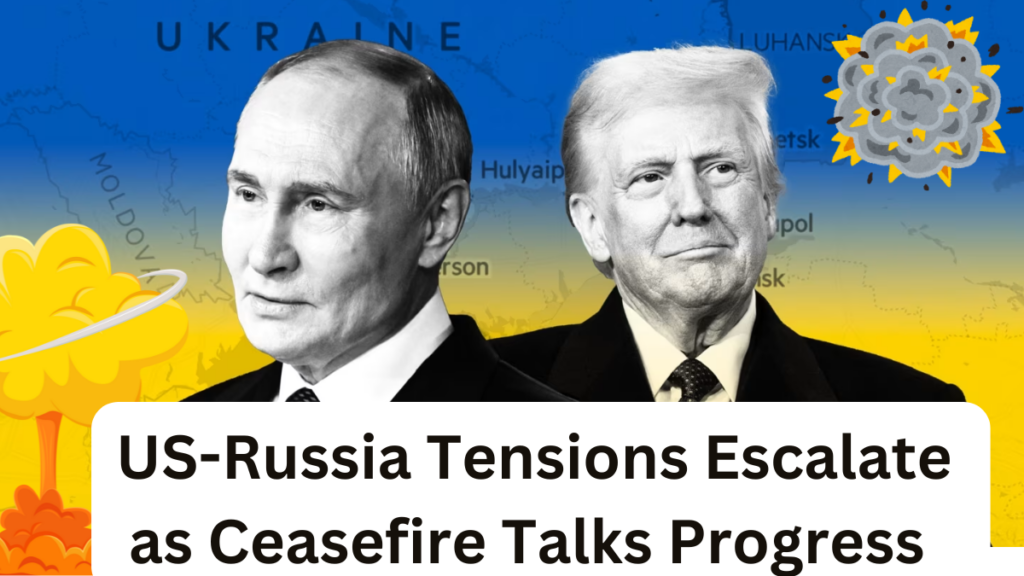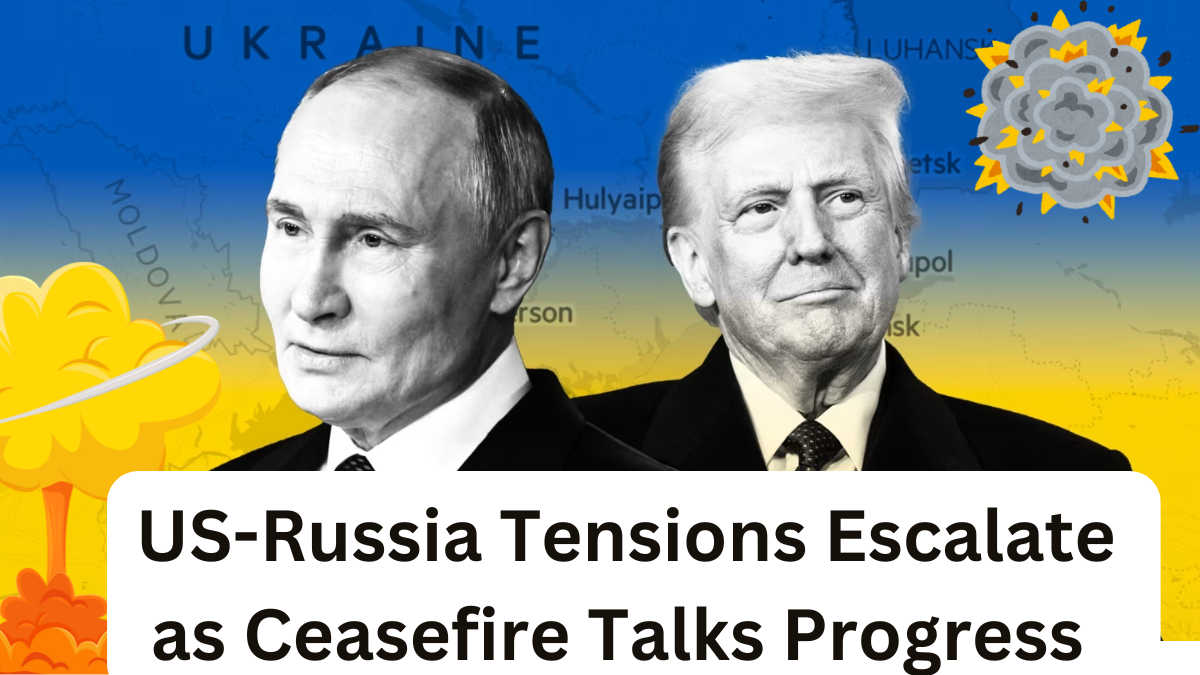As diplomatic efforts for a ceasefire in Ukraine gained momentum, US President Donald Trump issued a stern warning to Russia, emphasizing potential economic consequences if Moscow rejects the proposed peace plan. The situation remains tense as global leaders watch closely, hoping for a peaceful resolution to the ongoing conflict.

Trump’s Warning to Russia
During a media briefing on Wednesday, Trump warned that the United States could impose severe financial penalties on Russia if they fail to comply with the ceasefire terms. He stressed that these economic measures could have devastating consequences for Russia’s financial stability.
“In a financial sense, yeah, we could do things very bad for Russia, would be devastating for Russia,” Trump cautioned, making it clear that Moscow faced serious economic retaliation if peace talks faltered.
US Negotiators Head to Russia
To strengthen diplomatic efforts, Trump confirmed that a team of US negotiators was already en route to Moscow for crucial talks.
“People are going to Russia right now as we speak. And hopefully we can get a ceasefire from Russia,” Trump informed reporters during a meeting with Irish Prime Minister Micheál Martin in the Oval Office.
This diplomatic push is seen as a key move to prevent further escalation of the conflict, with US officials determined to ensure Russia’s cooperation in the peace process.
Ukraine’s Agreement and Ongoing Concerns
- Ukraine had earlier agreed to a US-backed 30-day ceasefire following productive talks with American officials in Saudi Arabia. This breakthrough marked a significant step toward de-escalation.
- Despite this agreement, Ukrainian President Volodymyr Zelenskyy voiced skepticism, expressing concerns that Russia could exploit the ceasefire to strengthen its military position.
- Meanwhile, the Kremlin stated that it was awaiting further details from Washington regarding the ceasefire plan before confirming its stance.
Zelenskyy’s caution stems from past incidents where Russia appeared to manipulate peace talks to gain a strategic advantage, leaving Ukraine wary of Moscow’s intentions.
Trump’s Balanced Approach
Despite warning Russia about financial repercussions, Trump stressed his preference for a peaceful diplomatic resolution. He made it clear that the US would only impose severe economic sanctions if Russia refused to comply with the ceasefire terms.
“I don’t want to do that because I want to get peace,” Trump said, adding that economic measures were a last resort.
His measured tone suggested that while the US was prepared to act decisively, peace remained the primary goal.
Strained Relations with Ukraine
While Trump’s recent stance on Russia appeared diplomatic, his relationship with Ukraine has faced significant tension in recent weeks:
- On February 28, Trump abruptly paused military aid to Kyiv following a heated confrontation with Zelenskyy in the Oval Office. The tense exchange reportedly revolved around Ukraine’s reluctance to commit to a temporary ceasefire, raising doubts about Zelenskyy’s cooperation.
- The suspension of assistance was lifted only after Ukraine agreed to the ceasefire terms and agreed to provide the US with preferential access to its natural resources.
This development created friction between the US and Ukraine, but officials in Washington maintained that restoring peace remained the top priority.
The Road Ahead: Russia’s Decision
The next move lies with Russia. Trump indicated that while he had received “positive messages” from Moscow, he remained cautious about trusting these statements.
“It’s up to Russia now,” Trump stated. “A positive message means nothing. This is a very serious situation; it could start World War Three.”
This remark highlighted the gravity of the situation, with Trump acknowledging the potential for catastrophic consequences if diplomacy fails.
Continued Diplomatic Efforts
- Vice President JD Vance confirmed that discussions with Russian officials would continue both by phone and in person over the next two days. These talks are expected to determine Russia’s stance on the ceasefire proposal.
- White House press secretary Karoline Leavitt announced that special envoy Steve Witkoff—who has played a key role in recent negotiations on both Ukraine and Gaza—would travel to Moscow later this week to push for a resolution.
- National Security Advisor Mike Waltz also spoke with his Russian counterpart on Wednesday, continuing efforts to build diplomatic momentum.
Final Push for Ceasefire
Leavitt expressed optimism that Russia would cooperate with the peace plan, emphasizing that success was within reach.
“We are at the 10th yard line, and the president expects the Russians to help us run this into the end zone,” she explained, using an American football analogy to describe the final phase of negotiations.
The statement underscored the critical nature of the current phase, with global stability hinging on Russia’s willingness to engage constructively in peace talks.
Implications for Global Politics
The ceasefire negotiations carry significant implications not only for Ukraine and Russia but also for broader global politics:
- A successful ceasefire could stabilize energy markets and reduce inflationary pressures worldwide.
- Conversely, if talks fail and tensions escalate, there is a growing concern that economic sanctions could trigger financial instability in global trade networks.
World leaders are closely monitoring the situation, with hopes pinned on diplomatic success to prevent further violence and instability in Eastern Europe.
FAQs
1. What economic actions did Trump threaten against Russia?
- Trump warned of severe financial consequences that could devastate Russia’s economy if Moscow refused to accept the ceasefire proposal. These measures could include sanctions targeting key sectors such as energy, banking, and trade.
2. Why did Trump initially pause military aid to Ukraine?
- Trump halted military aid to Ukraine following a heated argument with President Zelenskyy regarding Ukraine’s resistance to the proposed ceasefire. The aid was only resumed after Ukraine agreed to the deal and granted the US preferential access to its natural resources.
3. Who are the key figures involved in the US- Russia negotiations?
- Special envoy Steve Witkoff, Vice President JD Vance, and National Security Advisor Mike Waltz are among the prominent officials leading the negotiations. These figures have played significant roles in both Ukraine and Gaza-related peace talks.
4. What role did Saudi Arabia play in the ceasefire talks?
- Saudi Arabia hosted crucial discussions between US and Ukrainian officials, which resulted in Ukraine agreeing to the 30-day ceasefire proposal. The talks in Saudi Arabia were pivotal in breaking the deadlock and advancing the peace process.
Click here to learn more
